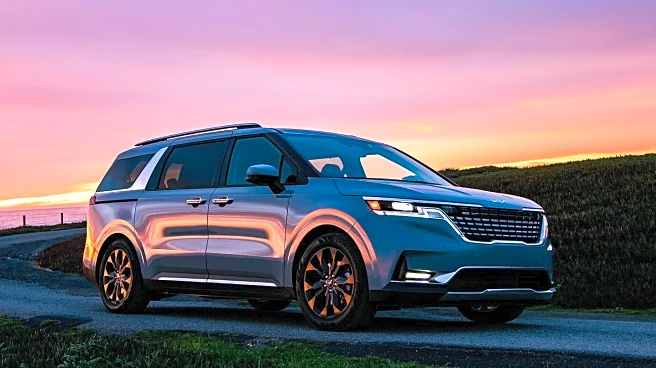What's Happening?
A mother of three, Caitlin, has taken to social media to defend her choice of driving a minivan, specifically a Toyota Sienna, over a more fashionable SUV. In her TikTok video, Caitlin highlights the practicality and convenience of minivans for families, especially those with young children. She emphasizes the spaciousness, ease of use, and features like multiple cup holders and a large cargo area, which she finds more accommodating than SUVs. Her video has garnered significant attention, with over 3.4 million views, sparking a conversation among parents about the benefits of minivans. Many commenters have expressed interest in switching from SUVs to minivans, citing similar needs for space and convenience.
Why It's Important?
The discussion initiated by Caitlin's video highlights a shift in consumer preferences, particularly among families, towards practicality over style in vehicle choices. This trend could influence automotive manufacturers to focus more on enhancing the features and appeal of minivans. The conversation also reflects broader societal changes, where functionality and family needs are becoming more prioritized in purchasing decisions. This could lead to increased demand for minivans, potentially impacting the SUV market and prompting manufacturers to innovate in both segments to meet diverse consumer needs.
What's Next?
As the conversation around the practicality of minivans continues, automotive companies might respond by introducing new models or updating existing ones to cater to the growing demand for family-friendly features. This could include enhancements in safety, technology, and comfort. Additionally, the ongoing dialogue on social media could further influence consumer perceptions and purchasing decisions, potentially leading to a resurgence in the popularity of minivans.
Beyond the Headlines
The resurgence of interest in minivans could also reflect changing cultural attitudes towards family life and transportation. As more families prioritize functionality, there may be a broader acceptance of vehicles traditionally seen as 'uncool.' This shift could also influence marketing strategies, with companies focusing on the practical benefits of their vehicles rather than just aesthetics.








